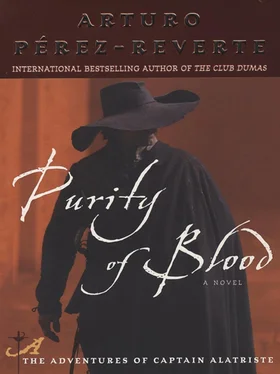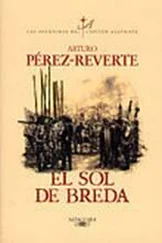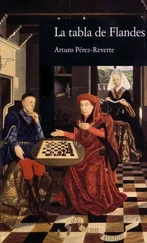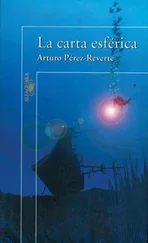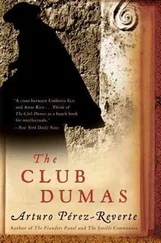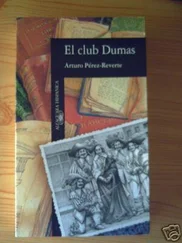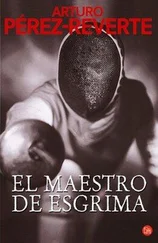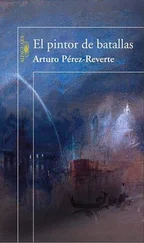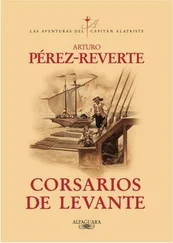Arturo Pérez-Reverte - Purity of Blood
Здесь есть возможность читать онлайн «Arturo Pérez-Reverte - Purity of Blood» весь текст электронной книги совершенно бесплатно (целиком полную версию без сокращений). В некоторых случаях можно слушать аудио, скачать через торрент в формате fb2 и присутствует краткое содержание. Жанр: Старинная литература, на английском языке. Описание произведения, (предисловие) а так же отзывы посетителей доступны на портале библиотеки ЛибКат.
- Название:Purity of Blood
- Автор:
- Жанр:
- Год:неизвестен
- ISBN:нет данных
- Рейтинг книги:3 / 5. Голосов: 1
-
Избранное:Добавить в избранное
- Отзывы:
-
Ваша оценка:
- 60
- 1
- 2
- 3
- 4
- 5
Purity of Blood: краткое содержание, описание и аннотация
Предлагаем к чтению аннотацию, описание, краткое содержание или предисловие (зависит от того, что написал сам автор книги «Purity of Blood»). Если вы не нашли необходимую информацию о книге — напишите в комментариях, мы постараемся отыскать её.
Purity of Blood — читать онлайн бесплатно полную книгу (весь текст) целиком
Ниже представлен текст книги, разбитый по страницам. Система сохранения места последней прочитанной страницы, позволяет с удобством читать онлайн бесплатно книгу «Purity of Blood», без необходимости каждый раз заново искать на чём Вы остановились. Поставьте закладку, и сможете в любой момент перейти на страницу, на которой закончили чтение.
Интервал:
Закладка:
The inquisitor stood before his lectern, slowly, ceremoniously, preparing to read my name. Just then a caballero dressed in black and covered with dust erupted into the loge of the royal secretaries. He was in mud-spattered traveling clothes, high riding boots, and spurs, and he had the appearance of having ridden—whipping his mounts from post house to post house—without rest. He was carrying a leather lettercase, which he took straight to the royal secretary. I saw that they exchanged a few words, and that Alquézar, taking the lettercase with an impatient gesture, opened it, glanced at it, looked in my direction, then at Fray Emilio Bocanegra, and back to me.
The black-clad caballero turned, and at last I recognized him.
It was don Francisco de Quevedo.
X. UNFINISHED BUSINESS
The fires burned all night long. People stayed very late by the Alcalá gate, even after the penitents were nothing more than calcified bones in a pile of embers and ashes. Rising columns of smoke were stained red in the light of the flames. Occasionally a breeze stirred, carrying to the crowd a heavy, acrid odor of wood and burned flesh.
All Madrid spent the night there, from honest married women, somber hidalgos, and highly respectable people, to the lowest of the low. Street urchins dashed around at the edges of the coals, as constables cordoned off the area. There were vendors galore, and beggars, making hay. And to each and every one, the spectacle seemed holy and edifying—or at least that was the view they affected in public. Poor, miserable Spain, always disposed to overlook bad governance, the loss of the fleet of the Indies, or a defeat in Europe, with merriment—a boisterous festival, a Te Deum, or a few good bonfires—was once again being faithful to herself.
“It is repugnant,” said don Francisco de Quevedo.
He was a great satirist, as I have already mentioned to Your Mercies, the consummate Catholic in the mode of his century and his nation, but he tempered all that with his deeply ingrained culture and limpid humanism. That night he stood motionless, frowning, watching the fire. The fatigue of his breakneck journey showed on his face and in his voice. Although in the latter, his weariness sounded as old as time.
“Poor Spain,” he added in a low voice.
One of the fires collapsed, sputtering, in a cloud of sparks, illuminating the figure of Captain Alatriste by his side. People burst into applause. The reddish glow lighted the walls of the Augustinian monastery in the distance, and the nearby stone pillory at the crossroads of Vicálvaro and Alcalá roads, where the two friends stood a bit back from the crowd. They had been there since the beginning, quietly talking. They stopped only when, after the executioner made three turns of the rope around Elvira de la Cruz’s neck, the brush and wood crackled beneath the novitiate’s body. Of all the penitents, the only one burned alive was the priest. He had stood firm until the last, refusing to reconcile before the priest attending him, and confronting the first flames with a serene countenance. It was sad that when the flames reached his knees—they burned him slowly, showing great piety, to allow him time to repent—he broke down, ending his torment with atrocious howls. But, with the exception of Saint Lawrence, no one, as far as I know, attains perfection on the grill.
Don Francisco and Captain Alatriste had been talking about me. I was sleeping, exhausted and at last free, in our lodgings on Calle del Arcabuz, under the maternal care of Caridad la Lebrijana. I’d fallen into a deep sleep, as if I needed—which was in fact the case—to reduce my adventures of recent days to the confines of nightmare. And while the fires burned at the site of the stakes, the poet had been telling the captain the particulars of his hurried and dangerous journey to Aragon.
The course suggested by Olivares had mined pure gold. Those four words that don Gaspar de Guzmán had written in the Prado meadows— Alquézar. Huesca. Green Book —had been enough to save my life and hobble the royal secretary. Alquézar was not only our enemy’s surname, it was also the name of the town in Aragon in which he had been born. And to that town don Francisco de Quevedo had hastened, changing post horses along the camino real —one dropped stone-dead in Medinaceli—in his desperate attempt to win the race against time. As for the green book, which was what the birth registry was called, it contained the catalogues, family genealogies, and listings kept by individuals or parish priests, and records that served as proof of ancestry.
As soon as don Francisco arrived there, he used his ingenuity, his famous name, and the money provided by the Conde de Guadalmedina to sniff through the local archives. And there, to his surprise, relief, and joy, he found confirmation of what the Conde de Olivares already knew through his private spies: Luis de Alquézar himself did not have pure blood.
In Alquézar’s genealogy—as in that of half of Spain—there was a Jewish branch, this one documented as having converted in 1534. Those ancestors of Hebrew origin disqualified the royal secretary’s claim of nobility. But in a time in which even purity of blood was bought at so much per grandfather, that history had been very conveniently forgotten when necessary proof and documents were created so that Luis de Alquézar could assume a high post at court. And as, in addition, he commanded the distinction of being a caballero of the order of Calatrava, which group did not admit any man who could not prove he was an old Christian and whose forebears had not defiled themselves in the practice of manual labors, the falsified documentation and the conspiracy to provide them were flagrantly illegal. Publication of that information—a simple sonnet by Quevedo would have sufficed—backed by the green book the poet had obtained in Alquézar’s parish in exchange for a weighty roll of silver escudos, would have destroyed the royal secretary’s reputation, resulting in the loss of his Calatrava habit, his post at court, and the greater part of his privileges as a caballero and man of substance.
Of course, the Inquisition and Fray Emilio Bocanegra, like Olivares himself, were already aware of all this, but in a venal world built upon hypocrisy and spurious manners, the powerful, the carrion-feeding buzzards, the envious, the cowards, and all swine in general, tended to look out for one another. God our Father created them, and in our unhappy Spain they had clung together forever, with great rewards.
“What a pity that you did not see his face, Captain, when I showed him the green book.” The poet’s quiet voice shouted his fatigue. He was still wearing the dust-covered clothing and bloodstained spurs of his journey. “Luis de Alquézar turned whiter than the papers I put in his hands, then he turned as red as fire, and I feared he was going to collapse of apoplexy. But I had to get Íñigo out of there, so I pressed even closer and said, ‘Señor Secretario, there is no time for discussion. If you do not intervene on the lad’s behalf, you are lost.’ And he did not even try to argue. That great scoundrel recognized that one day every man among us must settle accounts with the All-Powerful.”
It was true. Before the scribe could speak my name, Alquézar shot out of his loge like a musket ball, with a dispatch that said a great deal for his qualifications for the post of royal secretary—and any other matter that concerned him. He stopped before a stupefied Fray Emilio Bocanegra, with whom he exchanged a few words in a very low voice. The Dominican’s face had shown, in quick succession, surprise, anger, and dismay. His vengeful eyes would have struck don Francisco de Quevedo dead on the spot, had the poet—exhausted from the journey, on pinpoints because of the danger still threatening me, and determined to carry through to the end even if that meant there on the spot—given a fig for all the murderous looks in the world. Wiping sweat from his brow with his handkerchief, again as pale as if the barber had bled him too liberally, Alquézar slowly returned to the loge where the poet was waiting. And finally, over the royal secretary’s shoulder, Quevedo watched as on the dais of the inquisitors, Fray Emilio Bocanegra, shaking with spite and rage, motioned to the scribe. After listening respectfully for a few instants, that same scribe took the sentence he was about to read and set it aside, pigeonholing it forever.
Читать дальшеИнтервал:
Закладка:
Похожие книги на «Purity of Blood»
Представляем Вашему вниманию похожие книги на «Purity of Blood» списком для выбора. Мы отобрали схожую по названию и смыслу литературу в надежде предоставить читателям больше вариантов отыскать новые, интересные, ещё непрочитанные произведения.
Обсуждение, отзывы о книге «Purity of Blood» и просто собственные мнения читателей. Оставьте ваши комментарии, напишите, что Вы думаете о произведении, его смысле или главных героях. Укажите что конкретно понравилось, а что нет, и почему Вы так считаете.
